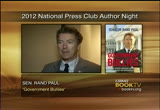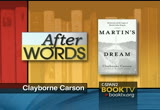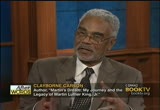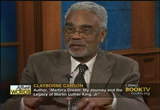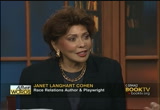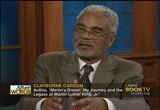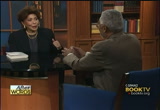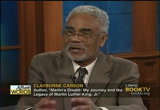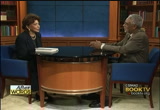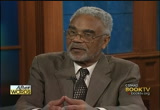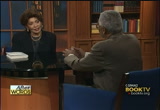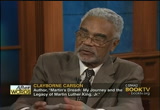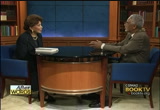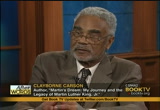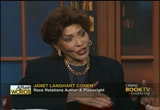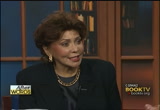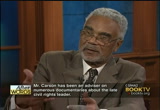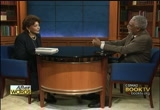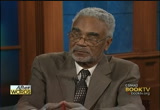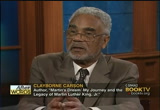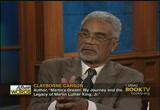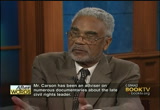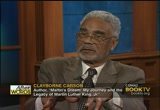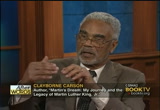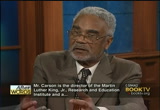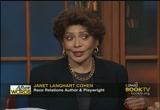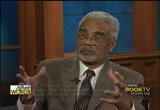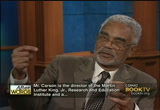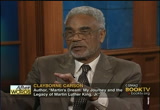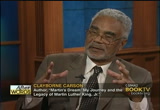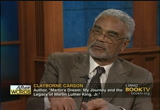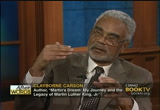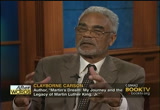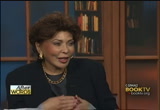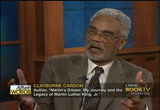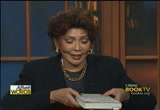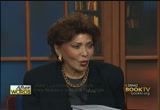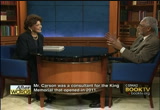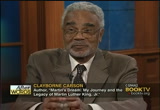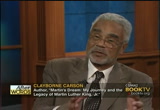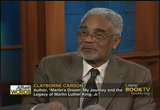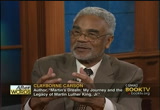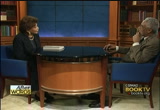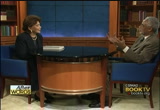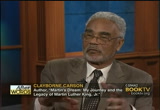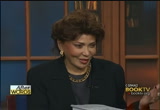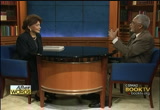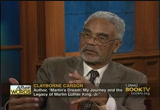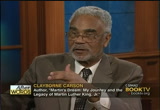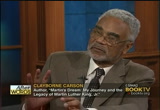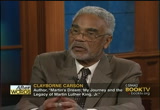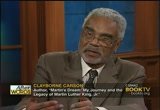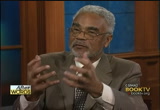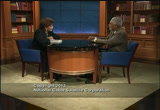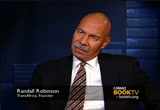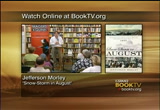tv Book TV After Words CSPAN January 20, 2013 9:00pm-10:00pm EST
9:00 pm
november 2012 elections -- >> guest: bring that up, i don't want to talk about 2012. i'm tired of 2012. let's talk about the future. 2012 wasn't very good for us, and we're going to have to figure out a way to appeal to a bigger electorate. >> host: are you running for president? [laughter] >> guest: that's classified. i can't -- your clearance is not high enough to hear that. no, i want to be part of the national debate, but i think it's too early to make that decision. >> host: government bullies, second book by senator rand paul, how everyday americans are being harassed, abused and imprisoned by the feds. ..
9:01 pm
is a memoir and a history book. in the book you talk about your personal journey and you are very candid about your life, and you also cover new insights as a historian to the life and legacy of dr. martin luther king, jr.. what prompted you to write the book this way? >> guest: well, i wanted to write something for the anniversary and this is 50 years of my life and king's legacy and my life coincides with my coming of age, so part of it was to do those two tasks. i felt that my life had been
9:02 pm
connected to the king legacy, and i felt there was something about my life that needed to be told to understand how king impacted me and how i got involved in this amazing journey of editing team newspapers. >> host: its an excellent reading and you and buy your of the same generation, and why too was coming of age in the 60's. the book i might say was bittersweet to me because i knew dr. king, i knew him the last two years of his life and i am bitter because of the way that he was taken from us because of hatred in this country. i guess we can start at the beginning because the beginning of the but you were on the mall with dr. king and near the end you are near the mall again 50
9:03 pm
years later with a monument that you helped design. >> guest: in between coming back so many times on different occasions to the mall, so it seems like a i lived in washington a short time that had a symbolic meaning for my life and sentimental. every time i come back i have all these memories. >> host: it's a beautiful city. you were 19-years-old in 1963. you were on the mall. the march on washington where dr. king gave that iconic address, i have a dream. how did you happen to go there? >> guest: part of it is i grew up in a small town where there weren't many black people. i think there were three black families growing up in los alamos. so i'd always been fascinated by what was the black community like? i didn't have very much exposure to it except on the visits to my
9:04 pm
relatives in detroit. so, i think i learned about the black community through the freedom struggle. i picked up my newspaper and there was martin luther king, the little rock nine, the students and dissidents -- in the sit-ins. i'm in college, i get to go to this student meeting, national student association meeting in indiana -- indianapolis. >> host: which is my home town. >> guest: and i met stokely carmichael. he was the first person sncc. he dismissed that. how could you think about going to that pyknic?
9:05 pm
>> host: >> guest: he didn't say that in terms of martin luther king. he was one of the people the was going to be at the march. i think that just for me he felt that i should be in georgia and cambridge maryland and he was at the university at the time, said he would be going to these places where his activism instead of going to the march 1 just was not what he had in mind, and i think that he was trying to recruit me into the movement. but for me going for the most exciting and radical thing that i'd done in my life at that point. >> host: let's go back to the march when he gave that address. what did you think of the speech? did you think it would be iconic for the day of infamy? >> guest: not at that point. for those of us that were there, it was the final speech in a long day of speeches.
9:06 pm
i was pleased to see martin luther king in person. i heard about him and everyone looks forward to what was he going to say because he was already known as this great orator but his speech was very short. it wasn't one of his longwinded. he spoke for an hour. this was 15, 16 minutes. and it was planned to be less. it was about seven, eight minutes. that's how he wrote his speech to be. >> guest: one of the things i found out later is that when it got to the end of his prepared remarks, he thought this requires something more. he had kind of laid out his
9:07 pm
agenda. malae can look at his advanced text and go back to the south and go back to all these places and continue to protest. but then he thought that the occasion required something more. he had been talking about this dream that he had. he talked about it for years. the american dream come and then it had become his dream and he had been in detroit just three months before and he talked about i have a dream that america will someday realize these principles in the declaration of independence. so, i think that he was just inspired by that moment. >> host: there was talk that jackson who was there was egging him on. >> guest: one of the things that i listened to a lot of recordings of that speech they
9:08 pm
allowed a stage whisper to him and i want to believe that story because it sounds -- >> host: she loved him. the reason i met dr. king is because i was staying at her home in chicago when i was working for evgeniy and dr. king would come by. as a matter of fact i met him the day after he was head hit in the head at the park. you talked about it in the book is getting hit in the head at gage park in necessarily illinois. did you meet dr. king? >> guest: i tried to get as close as i could but i got to the foot of the lincoln memorial but the notion as a 19-year-old that i would even shake hands with him, that could have been the thrill of my life. i saw him speak twice and both
9:09 pm
times i saw him as a member of the crowd. it was the other time maybe 1965, something like that. >> host: how did that impact you on the way home? >> guest: i didn't tell my parents i was coming and i have a bus tickets that went back to indianapolis so then i just had to hitchhike and i just hiked across the country. >> host: were you scared? >> guest: as the 19-year-old you think that you can do anything. >> host: how the hearing dr. king's speech that the impact you on how stokely was trying to influence you? because you talk to him after. >> guest: before, not after. it was probably three years before i talked to him again.
9:10 pm
by that time he had become -- in 1963 he wasn't a well-known figure. 1966 he had black power so that is the next time we got back in touch with each other again and from that point on i stay in touch with him for the rest of his life. >> host: we are going to talk about him more because stokely carmichael is one of my heroes as well as malcolm x. i was more in agreement with malcolm x, the leader malcolm x and stokely carmichael and dr. king despite knowing him and as i had gotten older i appreciate his tactics. he is the one with the monument on the mall. during that time you had misgivings about "time" magazine >> guest: from a distance i was very proud of martin luther king but i think that i kind of
9:11 pm
a sort of a lot of resentment on him. we kind of felt this way martin luther king is falling out with. we are trying to break new ground for me if he is moving to los angeles and getting involved in the movement there and getting involved in the group called nonviolent action committee which is kind of a sncc group at the level getting involved in issues like employment issues and urban issues and this was a year before he comes to chicago so from our perspective he is catching up and the same on the vietnam war. we are very involved in opposing the war from a very early stage, and he was much more cautious and not because he knew that he had much more to lose.
9:12 pm
>> host: and he lost a lot, didn't he? being against the vietnam war. >> guest: one of the things i discovered is that it is much easier for a 20 or 21 year old student to take a step. they don't have anything to lose except for maybe your dress status, which i did lose, so far came he understood that everything accomplished on the civil rights agenda with access to the white house and for congress, all of that was contingent not taking a stand on vietnam. >> host: he was very upset on the stands he took because he felt weak handled civil rights and voting rights over and now you are going to go against me as i am up for the reelection you are going to go against me on the vietnam war. >> guest: now will understand
9:13 pm
what courage it took to take the stand she did, and i understand more about why she hesitated coretta didn't hesitate. she was involved in the entire war movement but she wasn't a public figure so she could send her to a centrally speak for him. >> host: and again history proves dr. king right. >> guest: this is one of the ways in which i think that he is a visionary. i think that he understood the connection between the anticolonial movements that were going on around the world, and understood how the cold war had prevented us from seeing that we were on the wrong side, that because the communist movement had identified itself with anticolonialism many of these nationalists wanted to have the assistance of the soviet union,
9:14 pm
so we thought entirely of the war -- >> host: my enemy's enemy is my friend. >> guest: performing looking back, it wasn't that difficult of a choice because i knew i wasn't going to go into the military. >> host: how did you know, weren't you drafted? >> guest: i was drafted many times and i appealed it and i tried to be a conscientious objector and that was turned down, so it was coming down to do i want to go to prison for three years or do i want to explore the world? so i recognized if i left i might not be given to ever come back. >> host: when i was reading your book i thought that is a decision between your life and living your life outside of your
9:15 pm
country and being castigated. >> guest: that's what i had to really think through. >> host: you're father was a military man. >> guest: he was an officer in the army reserve. for him the military offered opportunities. he had been mired in the depression and drafted because the military needed black officers as a draftee he was able to go to the officer training school and had opportunities within the military that he never had in civilian life, so. it would have been the same efforts you. >> host: i was a nominee at west point, so i could see how my life might have gone in a very different direction. >> host: couldn't you have done with your brother and my
9:16 pm
brother did? they joined the navy said that they could reverts the draft. deduce think about that or discuss it? >> guest: i thought about it but at that time i was very politicized and i would have felt guilty that i was taking the easy way out. i think i knew if i could've gone into the military and i wouldn't have been sent to the front lines. i might have been sent not even to vietnam but at that time it was more the symbolism. i knew that i didn't want to support that war. >> host: people at that time couldn't reconcile and then serving this country. muhammad ali. >> guest: if i was going to fight for democracy and would have done it in mississippi and
9:17 pm
alabama. i wouldn't trigger 10,000 miles to vote for democracy. >> host: did you ever think about going down there? >> guest: i come very close in the project of 1964i went to new orleans and i met with bob moses and other people there and i fought very seriously. and probably if it hadn't been for the financing that they wanted people to bring their own money to bear themselves out and other things -- i worked my way through school, so i needed a job in order to go to finish college. >> host: talk about the period you mentioned sncc then there was dr. king's organization, would sclc. what was the overall mission of the movement? was a to get equal the is a big
9:18 pm
word or to get voting rights, civil rights, what else did they want and how were their approach is different from each other? >> guest: both of them thought in terms of the breeding rating and we mislead ourselves when we hear this term civil rights movement because if that had been the goal from 1965 the civil rights agenda had been achieved would have the civil rights act of 1964, the voting rights act of 1965 so that had been the goal martin luther king would have felt i'm going to retire and go to college and be a man campus minister stokely carmichael would have said i achieve my goal. none of them said that, none of the people i knew because we saw the goal as much more radical in some ways than that. >> host: why? >> guest: economic change, in power in the black community. that was kind of the root of the
9:19 pm
black power movement and black power for black people. using their rights that had been gained to actually bring about concrete. i think for many of us we saw in 1965 as the beginning, not the end. now we have basic human rights and now the question becomes what are you going to do with them? the black community by that time as 100 years behind because of the restrictions and discriminations. you can't just say suddenly you are going to pack to late to catch up. there has to be a movement. and i think as martin luther king said, where do we go from here and that is where we still are. we still haven't faced the question of what do we do with the rights that we gained? now that we are citizens what do we do with citizenship?
9:20 pm
>> host: you quoted this in your book about moving from the quicksands of the racial injustice to the hard rock of brotherhood. on that spectrum where are we? we have a black man in the white house and michele alexander endorsed your book the new jim crow. the statistics she writes about where black people are right now when the 21st century we are underemployed, unemployed, more afflicted with aids than other diseases of obesity and diabetes. more of us are incarcerated and get tough sentences for the same crimes. the suns in the black community for me is deafening coming from our generation. we would protest everything. as you said after we got the voting rights and civil rights, we wanted more and 65. why do you think -- >> guest: you can see the
9:21 pm
difference behind the kind of support king got when he was fighting for civil rights reforms after 1965 the level of support for king if you look at the polls, overwhelming support in the black community, widespread support even among the whites for what he was trying to do. if you look at after 65 when he moved to chicago and when he takes a stand on viet nam and higgins to support garbage workers and poor people in the poor people's campaign which is the first occupied movement he wanted to occupy the national mall even though the occupied campaign in recent years no one put forward something so rational and that is his support in the black community that went down dramatically. >> host: that would make white
9:22 pm
people angry? >> guest: because there was an element of support for the early king from black people who are doing well but still faced jim crow. so for them, once you remove these jim crow barriers, their agenda is gone. then it's just a matter in fact at that point they are overqualified. opportunities are going to get opened up because they are now no longer facing explicitly racial barriers. jobs are opening up. so, for them they don't need another movement. for the black poor the movement is just beginning, getting the right to go into a restaurant, if you are poor what have you
9:23 pm
gained? >> host: but a large amount of us are still poor. >> guest: one thing that happened after that is the people that came out of the middle class solve the responsibility to go and help mobilize those that are poor and destitute. that's what sncc was. the college students, the sons and grandsons and granddaughters , people like myself. my mother grew up in rural florida and segregated schools. >> host: where was your father? >> guest: originally from alabama, she was part of the black migration.
9:24 pm
it was against racism. >> guest: that is directly from most people the peasant background, the right to freedom was sent by staging a political movement, it was moving. that is what most people didn't some of them became politicized. >> host: they are different in the north. we don't think that racism -- >> guest: at least on the north for taking a stand.
9:25 pm
>> host: who were the people who most moved things? was it king, malcolm x was it stokely carmichael, was it john lewis. one of the ways i try to explain the students rosa parks made martin luther king possible the didn't make rosa parks possible. if she hadn't done what she did by refusing to give up her seat on that montgomery bus, martin luther king would have been an articulate, well meaning baptist minister. he opened up, she open the possibility for him to display the qualities that they had and
9:26 pm
to rise to the location. >> host: she also said as you know while she was sitting on the bus refusing to give up her seat she was thinking about the material of a new young black boy from chicago who went to mississippi and because he looked at a woman he was brutally murdered. do you think that his death changed or sparked anything in the civil rights movement? >> guest: a lot of things did. it was his death, it was the brown v. board of education decision. as people like barbara johns, the high school student that led a walkout of the segregated school because of protesting in the interior education. that's in 1951 we don't even know their names anymore even with rosa parks and montgomery.
9:27 pm
there were two other teenagers who did the same thing. as of this resistance, largely among the young people. >> host: on both sides is and it? >> guest: definitely. when you talk about south africa we all remember nelson mandela it was the students and others that revised the movement that was more abundant in the late 60's. >> host: he did something that got a lot of criticism for him and dr. king. tell that story about the crusade. >> guest: he was at a crucial point in birmingham.
9:28 pm
he gave a direction in march and millions of people followed him, completely wrong. from montgomery which came didn't initiate through birmingham, king is a leader but only in birmingham can he initiate and sustain the movement but that point in april of 1963 all of the people that are adults that are looking to get arrested had already been arrested including king himself. if he had lost their would have been no march on washington. there would have been no peace prize talking about martin
9:29 pm
luther king. so let's save the day in birmingham there's no adults to be arrested. james and dorothy are saying there's these young people better just eager to be arrested. they are eager to join in and we have been restraining them and saying you are too young. at that point they come into the picture and they really save the day for martin luther king. >> host: are there any pictures at that mind that spring to mind to you? >> guest: of course. the young people and the dogs and the hoses but one involved that told me about was during high school because the teachers and principals knew they had to keep the students under control and by that time the students resentments were wailing over.
9:30 pm
and at this one school they locked the gates. >> host: how old were they? >> guest: high school age. at a certain point the students left and actually pushed the fence down. >> host: they say a child will lead the way. >> guest: they couldn't be restrained at that point and that changed the momentum of the birmingham campaign and that became the basis of kennedy introducing the civil rights act and the march on washington is in some ways an extension of what was going on in places like birmingham. wasn't that the bombing of the
9:31 pm
church. >> guest: that is a reminder of the sense of triumph on the march on washington just a few weeks later. he was going back to birmingham and conducting a funeral. >> host: do you think they felt guilty? guilty of all of these kids being in jail, he tried to explain. the children are doing what they know they need to do for future generations. my own parents didn't want me to get involved. >> host: of course not.
9:32 pm
they got me to the los alamos. >> host: you mentioned in your book the church bombing who to react to children being murdered in a brutally murdered. and we all see what happened in that tragedy at the sandy hook elementary school why were people moved by those children being hurt? >> guest: why aren't white people as concerned about the death of a black child as we are about the death of a black child? that is one of the fundamental issues that we still address. we have had situations where assault weapons are used on a weekly basis, a monthly basis and their urban areas and the
9:33 pm
victims are black children. >> host: 2,000 children, black children were murdered on the south side of chicago and a seems to have mattered more that they were killing each other than that they were children who were dead, and it doesn't seem to be the uproar in the country. in our community -- >> guest: but that's where we are as the nation. i think most americans, black and white, all races understand that we are not the equal nation that -- >> host: that we say we are. >> guest: that there is still a reluctance to address that issue and understand that part of it comes from the problem of school education as if white children are in inferior schools
9:34 pm
there is action. and i think that is one of the things about desegregation if they get their kids into a school with white kids they have got leverage. if one of the problems is the way in which we went about desegregation is the degree that we should have had that kid should have been allowed to go to central high school. but that was -- little rock nine? what about 100 in the black school what is being done to make sure their education as equal? that would have cost a lot of money and a lot of resources. that's where the nation failed in that time. we need to break down the racial barriers.
9:35 pm
we need to have it possible for an all white school but that still doesn't deal with the problem that happened with the predominantly black schools. >> host: i was living at boston and the early 70's. i call it court ordered busing. we didn't want our children, black children to go to school with white kids because we wanted to integrate. we wanted to go to the schools because they were better, the books were better, teachers were not necessarily better but the opportunities for better come and it brings my other question where were we on the quicksands of racial injustice and the hard rock? where are we in this country not just black people but white people, too? are we somewhere in the middle? are we almost there? >> guest: i think we need to do two things. one of them is to celebrate the victory is to read any generation of people who bring
9:36 pm
an end to the jim crow system in the south, they legalized segregation and discrimination that existed, the generation that ended colonialism. when i tell students what colonialism they have to look in the history books to kind of find out that there is a few colonies left, about apartheid. what was the outcome of this kind of discrimination, racism. so the victory over white supremacy as a legalized system of oppression that was a tremendous victory and the heroic figures it was during that time the majority of humanity, the status changed. that's never happened where the majority of people in a relatively short period of time went from being peasants to
9:37 pm
citizens -- >> host: but 308 years or more of slavery and they have about 150 years of apartheid here in america of jim-crow and we were told to wait and in many black people were told to wait four more years for president of thomas second term. for him to act -- women have brought their issues to the president, we want comprehensive immigration reform, other governments are bringing their issues to our president. we are not bringing our issues. martin took his issue -- >> guest: who is stopping us? it's one thing to say president obama is not responding. about what are we doing to put the issue so that he has to respond.
9:38 pm
if you're not using that leverage everyone knows is the black vote, the latino vote that is decisive in the last election when men come each of these groups that played a role in our e electing him, that's why in my view when i came here for the inauguration i said the day before the inauguration i gave a speech and i said the important day is not tomorrow. we celebrate now. the important days the day after tomorrow. what are we going to do then? for a lot of people they went home in a celebrated. >> host: it is a milestone. i never thought i would see a black president.
9:39 pm
we talked very little about you but i think we are getting to know you hearing your comments. you edited dr. king's papers. there are people is in boston university where you went to school and other papers. how are the papers you edited different? what did you find? >> guest: the peepers i'm editing, the papers at boston, the peepers and atlanta, the papers and so many different places, hundreds of archives are none of the world. i've gone -- i have papers in india. so we bring them all together and we decide how to publish them and make them available to people. that's been my job for the last 25 years. >> host: ury history in coming your african-american. i can see an interest. what brought you to want to do this? coretta asked you but what was your motivation for wanting to do it?
9:40 pm
>> guest: i think i didn't want to not do it. i didn't know wanted to devote the rest of my career to do this. >> host: how did she ask? >> guest: she asked are you interested and when we first talked people that have done work really on the grassroots dimension of the struggle not so much on the role i never knew much about him apart from the movement. so, but then she came out and i remembered you're going to spend the rest of your career editing martin luther king's papers and you turned it down and i think she was a little bit wiser than i was at that point of recognizing you don't get asked by a person you've admired all
9:41 pm
your life. >> host: how did she hear about you? >> guest: john franklin and bobby hill, historian at ucla. and number of people that were mutual acquaintances. she was looking around for someone to take on this role and said that this time there was a young scholar out of stanford and he would be good. he's written about the movement pete he was at the march so that's what led to the phone call. >> host: she had love letters from dr. king and some of the voters she had under her bed at her house. >> guest: i heard these rumors after i became -- i had to go all over the world as i said to india and ghana and all these places to get material and people were telling me but you know, she had some papers under her bed, in her house. so part of what i tell is this gradual process by which gained
9:42 pm
access to those materials. >> host: how did you do it because -- >> guest: it took time. >> host: some of these were interested in a lot -- but she had them in her home. >> guest: that is a part of it. when he decided -- >> host: now he is the older -- he's the younger son of dr. king? >> guest: sees the older, the younger son, yes, i'm sorry. >> host: two sons and two daughters. >> guest: he is the younger son and he had decided that he wanted to bring them all together and put them up for auction. so at that point the question became what's going to happen with all the papers in the home. and that is when i began to go through all of these materials. and i found that there were extraordinary rich.
9:43 pm
they opened up a whole new dimension about martin luther king because they had to deal with his life as a minister. you could go through that and find out what he was putting together the sermons, what is he ruling, his library was there and i would go into the basement and go through all these materials and i would find hand written -- >> host: >> guest: many times in longhand. folks had this longhand yellow pad that he rode out the draft of his acceptance speech for the nobel peace prize. when i first saw that, it made my heart stop because first of all we had this sense that the last person that touched this was martin luther king. >> host: you talk in the book about him and being more of a profit than a protester.
9:44 pm
did you see his early philosophy as a student as a theologian? >> guest: i.t. one of the things that set him apart as other people could mobilize people in and have meetings and campaigns and stuff like she wasn't really the best at that. one example would be the montgomery bus boycott. they organized the boycott. was almost 100% successful before he became the leader. but what he did do is after that first day of the successful boycott when they had a rally, he was the one that when the history books of the future to say there lived a great people -- he was the one that recognized the historical
9:45 pm
importance of what they had done. i'm sure they are looking at it and saying we have a boycott to not bring about a desegregation, but better treatment under segregation. so no that is not what it's about. it's about a move meant that later people will be writing about and he is right. as that young man on the mall when you were 19 and you had your feelings stirring and then there you are this historian some years later reading what he wrote in that draft where was the picture of him and how did it change for you? >> guest: there was a chapter compiling the autobiography because at that point i am
9:46 pm
taking all of his autobiographical writings and putting it together in a narrative, the kind of - that he would have written if he had the time. when i get to the march and recognizing that now i can see that person that i saw from a distance, and i'm not looking at me through his eyes because he is describing people like myself that are coming to the march from all different directions and all forms of transportation and these people who are becoming active in the great struggle, so i am seeing my 19 year old self through the eyes of the person i saw up there. if you could imagine doing at that point even imagining 12
9:47 pm
years later i would be professor of history at stanford university, in 1963 that would have been inconceivable. >> host: exactly. >> guest: but two years later i would be getting a call from coretta scott king where i would be designing the king memorial. >> host: there is another question about the papers in the sermon. there are charges against dr. king. you found someone wanted discoveries. i hate to talk about it, but and full disclosure we have to talk about all these things. >> guest: all the things that are necessary are to not put them on a pedestal. martin luther king was a flawed individual and i found this out when i was going through his academic papers.
9:48 pm
how old, was he in school? >> guest: he was in college. these were academic papers. it wasn't like he was handing in a paper that he had copied from someone else. it was the way i would look at it is that he was taking passages and sometimes citing them accurately, sometimes not attribute in. >> host: but they preach on the bible -- >> guest: they don't have the college professor. that's the difference. there are specific rules what you can do and can't do, and one of them is everything that you get from another source you attribute to that source >> host: we need more time, this is a wonderful book. you what to do more with dr. king's legacy than just write a book or do papers.
9:49 pm
you have written passages of martin luther king. you took the play to china and palestine. those are amazing places to take a play about dr. king who was a protester against government pity the talk about that. >> guest: i've always been trying to find other ways of doing documentaries about the movement of martin luther king. i looked at by is on the prize and other things. so the play -- i was a colleague playwright and she suggested loci i have to create my documents by interviewing those people. you spend your life putting together all these sources. why don't you take this information and transform it into a play. >> host: that was a great idea. >> guest: i thought it was a good idea, too.
9:50 pm
i didn't know how much work i was going to get involved in and how difficult it would be. but i did it and the play was produced and stanford and i worked very closely with of the drama department and they put it on their program and we didn't. since then i've been tinkering with it and it's been like a hobby. >> host: you have some of it in the book in taking it to china and palestine how did you write a play, you're a historian and professor, go to a play, go through all you had to go through different governments to do it and what was done reception in those respective areas? >> guest: in china one of my former students was there comes a that was the accident. i had visited her and she was flint in chinese. she was there for a long period of time and she had seen them
9:51 pm
perform can. i had written eight -- >> host: -- >> guest: he read from the script. she said why can't we do this in china, it would be a good impact to bring king said she convinced the national theatre of china to do it. so i had a little theater company in china -- this was in 2007. and we performed it in a theater less than 2 miles from trademark and minn square. >> host: in chinese? >> guest: in chinese. we were performing the birmingham protest with a chinese martin luther king leading protesters, and all of this is taking place within walking distance of the and and and square. translating the legacy and bringing a gospel choir like a
9:52 pm
greek chorus and three of my students are part of that choir and i called them up and said he would you like to go to china, the national theatre of china? so they had the opportunity to come and work with the greatest theater company as well as people from other parts of the united states because this is the first time african-american performers had performed on the same stage in a play in china. once i did it in china i thought well, what else? i had taken the interest and had gone to the palestinian territories back in the 90's because of the way of nonviolence and the need to bring on violence and to this dispute between the israelis and the palestinians. and i thought why not bring it
9:53 pm
to their? this was the palestinian national theater taking on this play and they to get to eight different communities, not just in jerusalem, and east jerusalem and in all these different -- >> host: what was the reaction from the government? you are bringing again protestors in the story. would you like to have it? >> guest: we had a little bit of trouble getting in but once we got into israel coming to israel and jerusalem they chose not to oppose it to a i'm sure that they had shut it down if they wanted to
9:54 pm
>> host: the word terrorism as always mentioned. here you found the interest in nonviolence. >> guest: yes, including one of the students that had worked with me in the class and i had taken him to india. a student from ramallah so i had a palestinian student in hindu india and he comes back to his hometown in ramallah and now she is one of the leaders of the nonviolent movement and on the west bank and he staged the freedom ride. >> host: how did it turn out? >> guest: they got arrested of course. that's what happens. but it was a way of challenging the discrimination against palestinians in a non-violent way. >> host: there's so much to talk about. we didn't get into your being on the mall again that was dedicated. did you have anything to do with
9:55 pm
the major -- >> guest: i tell the full story of that, all the good and bad and we see part of the vision set in stone and we see the things that were set in stone that or not a part of the vision. >> host: how did you feel when you stand and look at king having appointed you at thomas jefferson what did you feel? >> guest: one is looking directly at jefferson and madison and the memorial was built towards reagan airport. [laughter] >> host: you talk about the conversation they would have had. what do you think dr. king would say to thomas jefferson if the had a conversation? >> guest: exactly what he did say. he wrote wonderful words to be of let's live up to them. we need as a nation -- we justify our independence on the basis of this declaration that
9:56 pm
says our people are created equal and endowed with rates so now we have an obligation as a nation. if we justify our independence they have to live up to it. >> host: his last book was titled where do we go from here coming and your book, "martin's dream" is a wonderful dream. i thank you for this book. if you did something to be to look at it and i did something my teachers told me never to do. aandahl geared some of the pages because i wanted to go back and read. >> host: it is used as you can see. thank you so much for being on "after words." good luck with the book. >> guest: thank you. >> that was "after words," book tv's signature program a much authors of the latest nonfiction books are interviewed by
9:57 pm
journalists, public policy makers, legislators and others familiar with their material. "after words" airs every weekend on booktv at 10 p.m. on saturday, 12 p.m. and 9 p.m. on sunday at 12 a.m. on monday. you can also watch online. go to booktv.org and click on "after words" nseries and topics list on the upper right side of the page. i can't count the times that americans say we are the best country in the world to read what a marvelously stupid thing to say of all of the countries in the world. why do we have to believe that we are the best?
9:58 pm
what does that mean and why we have to assert that all of the time? what does it mean to other people that consume it? american products go around the world, information products go around the world so you are observed by people in every corner of the world. and we teach them not to like last. gratuitously to estimate author when he goes on trial in december of 1835 he is eager to win a conviction. by this time, says 410 has come through and come to the defense
9:59 pm
of her alleged assailant. and she says in the trial that arthur never lifted the ax, she never believed that he intended to hurt her, she felt safe in his presence, that he was just drunk and she wanted the whole thing to go away. well, she was in placable and he didn't listen to this. he managed to get other people to override her testimony, and so are there is convicted and there is only one punishment for that, which is the death penalty, capital punishment. and so, arthur goes on to death row and in january of 1836 is sentenced to die in about a month. and so with the clock ticking, mrs. thorton does something even more unbelievable and was amazing that she testified on arthur's behalf in the criminal
575 Views
IN COLLECTIONS
CSPAN2 Television Archive
Television Archive  Television Archive News Search Service
Television Archive News Search Service 
Uploaded by TV Archive on

 Live Music Archive
Live Music Archive Librivox Free Audio
Librivox Free Audio Metropolitan Museum
Metropolitan Museum Cleveland Museum of Art
Cleveland Museum of Art Internet Arcade
Internet Arcade Console Living Room
Console Living Room Books to Borrow
Books to Borrow Open Library
Open Library TV News
TV News Understanding 9/11
Understanding 9/11